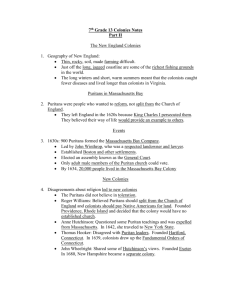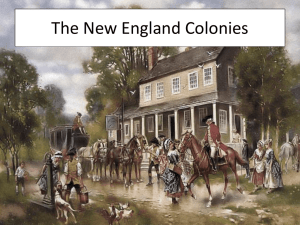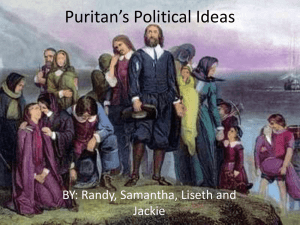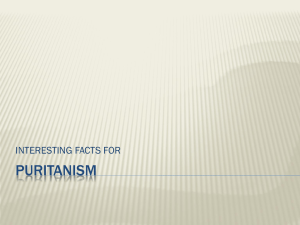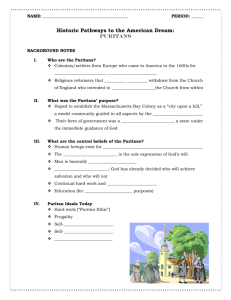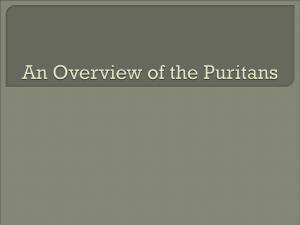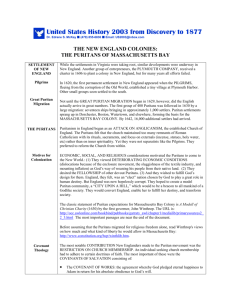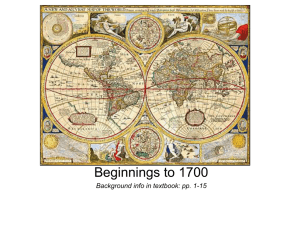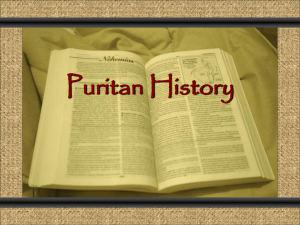Chapter 3 Section 2
advertisement
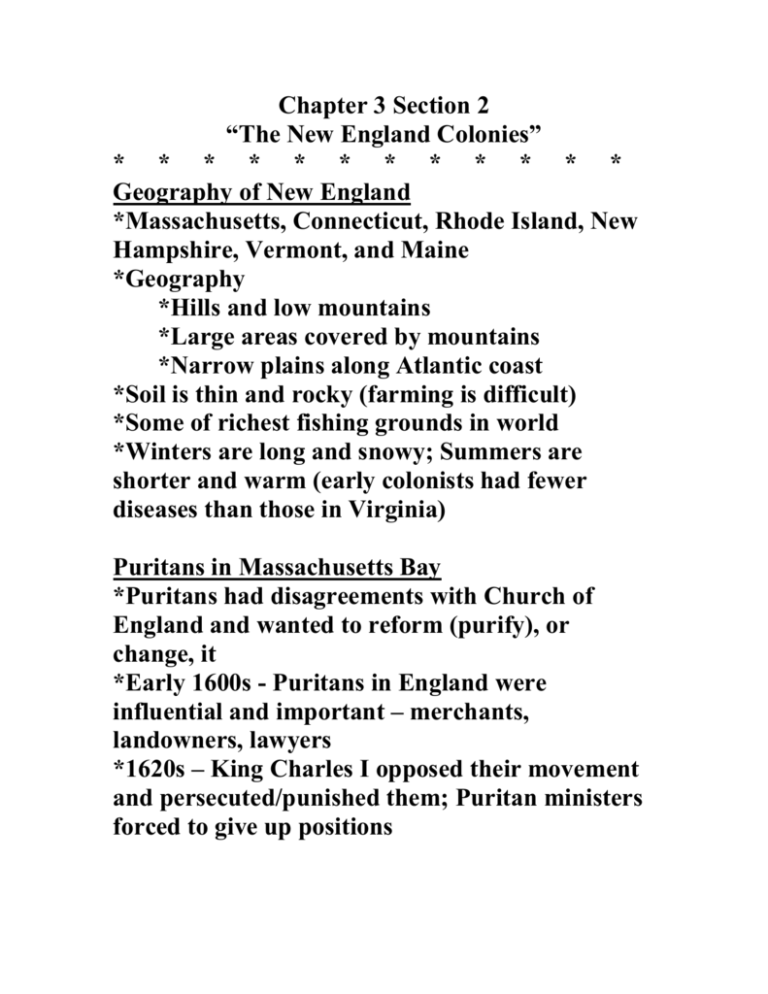
Chapter 3 Section 2 “The New England Colonies” * * * * * * * * * * * * Geography of New England *Massachusetts, Connecticut, Rhode Island, New Hampshire, Vermont, and Maine *Geography *Hills and low mountains *Large areas covered by mountains *Narrow plains along Atlantic coast *Soil is thin and rocky (farming is difficult) *Some of richest fishing grounds in world *Winters are long and snowy; Summers are shorter and warm (early colonists had fewer diseases than those in Virginia) Puritans in Massachusetts Bay *Puritans had disagreements with Church of England and wanted to reform (purify), or change, it *Early 1600s - Puritans in England were influential and important – merchants, landowners, lawyers *1620s – King Charles I opposed their movement and persecuted/punished them; Puritan ministers forced to give up positions The Puritans Leave England *1630 – about 900 Puritans formed Massachusetts Bay Company – received charter to establish settlements in what are now Massachusetts and New Hampshire *John Winthrop – leader of Puritans *Puritans believed that people were basically bad and had to live by strict standards of behavior in order to make up for their sins. Common Puritan disciplines included hard work and staying away from gambling, drinking, and swearing. The Massachusetts Bay Colony *Established several settlements, including Boston (excellent harbor) *By 1643 – about 20,000 people lived in Massachusetts Bay Colony *By mid-1630s, they had an elected assembly (General Court) and colony’s governor elected each year *Puritans founded their colony so they could worship as they chose; they did not give nonPuritans the same right. Puritans did not believe in religious toleration (others have the right to different religions) New Colonies *Disagreements about religion led to start of other colonies in New England *Roger Williams, minister of church in Salem, believed the Puritans should split entirely with Church of England; also criticized colonists who had seized Native American lands. Williams specified that colonists should pay Native Americans for their land. *1635 – Williams forced to leave Mass. Bay and established Rhode Island (bought land from Native Americans) *1636 – founded Providence, RI *By 1644 – colonists (RI) received charter from king to govern selves; colonists decided RI would have no established church (religious freedom!) Anne Hutchinson’s Dissent *Anne Hutchinson (Boston) questioned some of Puritan teachings *1638 – put on trial and expelled from Mass. Moved to part of Rhode Island and then New York Settling Connecticut *Thomas Hooker, minister, disagreed with Puritan leaders *1636 – took about 100 followers from Mass. to Connecticut, establish Hartford; many Puritans followed *By 1639 – colonists wrote Fundamental Orders of Connecticut, which established a new government with an elected legislature and governor *1662 – received charter from king granting selfgovernment *John Wheelright agreed with Hutchinson; also forced to leave Mass.; moved to New Hampshire and founded Exeter *1680 – received charter from king making New Hampshire a separate colony Growth and Change *Puritans believed towns and churches should manage own affairs; also believed people should work hard and live in strong and stable families *Puritans towns governed selves using town meetings; restricted to male heads of households *Subsistence Farming (enough to feed selves with a little left over for trade), making leather goods, fishing, shipbuilding were main occupations King Philip’s War *By 1670s, Native American population decreasing (disease); only about 12,000 in New England region (one tenth of pop. in 1570s) *1675 – chief of Wampanoag (Metacom/King Philip) opposed English and joined forces with many other Native Americans to prevent Puritan expansion *Fighting lasted a year and cost thousands of lives. Metacom/King Philip and allies destroyed 12 English towns *1676 – Metacom/King Philip captured and killed (ending fighting); end of war left English free to expand Puritan Influence Declines *By 1670s – new generation of people born in North America; people concentrated on running farms and businesses instead of religious emphasis *Towns grew but religious rules of the original founders now had less influence over people who lived there
